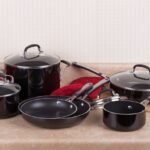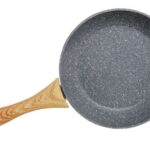Titanium is a very light but incredibly strong metal. Due to its impressive strength-to-weight ratio, titanium is used in a wide variety of industries. Titanium is becoming increasingly popular in the manufacture of cookware due to its lightness, non-reactivity, and strength.
There are two main types of titanium cookware:
- Pure titanium cookware popular for camping
- Titanium-coated cookware, also known as titanium ceramic cookware, has a base made of heat-conducting metal and a titanium-infused ceramic nonstick coating.
In addition to the properties that make titanium a desirable metal for making cookware, some properties of this metal are not ideal for your cooking vessels. Let’s go deeper.
Titanium Cookware Pros
Titanium is non-reactive
Today, consumers are more concerned about the safety of their cookware. Safety concern was particularly highlighted by the discovery that Teflon-coated pans release toxic fumes into the air when overheated.
Unlike some other metals, titanium is inert and does not react with food. With titanium pans, you can be sure that no unwanted particles and chemicals will get into the food you prepare. You can safely use titanium cookware to cook foods with acidic or alkaline ingredients. Your meals have no metallic smell or taste. This also applies to cookware with a titanium-reinforced coating, as the titanium in the coating prevents the metal from reaching the bottom of the food. In addition, unlike Teflon, titanium does not emit harmful fumes when exposed to high heat.
Titanium does not rust
When titanium is exposed to oxygen, it forms a layer of titanium oxide on the surface. This oxide barrier gives titanium excellent corrosion resistance and extends its lifespan. Additionally, this protective oxide layer prevents the cooking surface from being scratched and damaged.
Strength and durability
Titanium has the highest strength-to-weight ratio of any metal. Unlike aluminum, which bends easily, titanium cookware is resistant to bending and can withstand heavy wear and tear.
This metal withstands high temperatures very well and is suitable for use on open fires. By reinforcing the nonstick interior with titanium, manufacturers increase scratch resistance, making your pan less susceptible to scratches and damage from cooking utensils.
Titanium is a very light metal
Titanium is one of the lightest metals in the world and is commonly used in the manufacture of outdoor gear. With the same strength, titanium is 40% lighter than steel. If you need to cook outdoors, titanium cookware in your camping backpack can reduce the strain on your arms.
Many people prefer titanium as a safe alternative to aluminum because aluminum has been linked to Alzheimer’s disease. Not only does aluminum release unwanted components, but it can also react with acidic foods and change the taste of your meals.
Titanium Cookware Cons
Titanium is a poor conductor of heat
Titanium conducts heat slowly and unevenly, so this metal is not the best choice for baked goods. It is also uneconomical because slow heat conduction increases energy consumption and cooking can take longer. Due to its low thermal conductivity, pure titanium cookware is rarely used for everyday cooking.
Titanium does not have a non-stick capability
Unfortunately, pure titanium has no non-stick properties, meaning food will stick to the pan. It makes cooking and baking less enjoyable, increases the amount of added oil, and makes cleaning more difficult.
Titanium is not induction-compatible
Pure titanium cookware is not suitable for induction as titanium is a non-mag1netic metal. Titanium-coated cookware with an aluminum base is also not suitable for induction.
Titanium-coated cookware with a magnetic steel layer is suitable for induction cookers.
Is Pure Titanium Cookware Safe for Cooking?
Yes. Pure titanium is one of the safest materials for food contact. It does not add any unwanted ingredients to your meals. This allows you to easily prepare dishes with acidic ingredients.
Is Titanium Nonstick Cookware Safe?
A common complaint about pure titanium cookware is sticking issues. To prevent food from sticking and to make cooking and cleaning easier, manufacturers provide the cooking surface with a ceramic coating.
The lower-quality ceramic coating can contain potentially harmful substances. Always buy titanium cookware from reputable manufacturers and avoid buying unreasonably cheap items. Read the description to ensure the coating is PFOA-free.
Is Titanium Reinforced Ceramic Non-stick Coating Safe?
This type of cookware is usually made with an aluminum inner core to ensure excellent heat distribution for quick and even cooking.
Titanium is often added to the non-stick ceramic coating to increase durability. This ceramic non-stick coating ensures that food slides out of the pan easily. Unlike regular ceramic coating, titanium-reinforced ceramic coating is tough enough to resist chipping and peeling. The integrity of titanium prevents the metal of the base from interacting with food, so you can prepare your favorite dishes with confidence.
We can conclude that titanium-infused ceramic-coated cookware is a safer option for cooking food than ordinary ceramic-coated cookware.

So, Is Titanium Cookware Good?
Pure titanium cookware can be a good choice for activities where lightweight materials are preferred, such as hiking and camping. However, this type of cookware is not suitable for cooking in the kitchen. Pure titanium does not have thermal conductivity, which is a necessary property for high-quality cookware.
Cookware with titanium-reinforced coating is a much better choice for your everyday kitchen tasks. If the base is made of heat-conducting metal, titanium in the coating increases the scratch resistance, inertness, and durability of your cookware. To ensure you get what you are looking for, purchase your titanium-reinforced cookware only from reliable manufacturers or suppliers.



